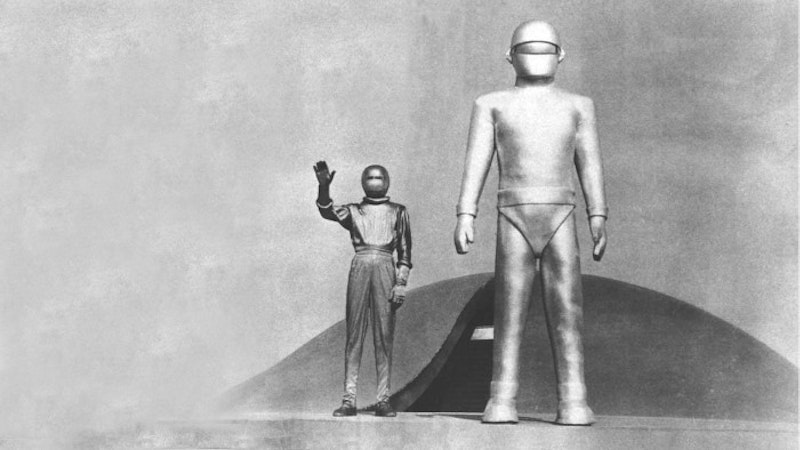If the world was somehow suspended, and time moved in an unnatural way, humans would be thrown into chaos. If the world came to a halt, and technology was disrupted, humans wouldn’t choose silence, solitude, and reflection. They’d enter into collective stupidity followed by insanity.
Robert Wise’s The Day the Earth Stood Still (1951) isn’t just a science fiction film, but an exploration of what happens when life stops and is threatened to the point of its annihilation. Michael Rennie plays Klaatu, a humanoid alien, who lands in Washington, DC, along with a robot named Gort. It appears that he comes in peace but a strong air of suspicion surrounds him since Earth people aren’t sure whether to take him at his word or not.
After taken to the Walter Reed Hospital, Klaatu quickly realizes he’ll be held under arrest unless he escapes. The President’s secretary asks Klaatu why he has chosen to visit Earth, and Klaatu tells him that he has an important message to deliver to the leaders of all nations. But, he’s not interested in meeting with the leaders separately; rather, he wishes to speak to everyone at once.
The secretary informs the naïve Klaatu that such a request is impossible because the political situation is precarious, and no leader would agree. Klaatu has no choice but to escape the hospital. He finds a room for rent in a boarding house, and here he meets Mrs. Helen Benson (Patricia Neal), a widow whose husband died in World War II, and her son Bobby. Klaatu introduces himself as Major John Carpenter, and befriends Bobby, with whom he explores the city and the American way of life. Klaatu wonders why there’s so much evil and death on Earth, and why people are choosing destruction over creation.
But time’s running out, and philosophical reflection isn’t Klaatu’s primary concern. Unless the nations of the world come together, Klaatu has no choice but to see Earth as a threat to other planets. If humans have no qualms about destroying their own kind, then why would they have any difficulty destroying the aliens?
Klaatu’s fear of his own destruction isn’t without merit. The military’s after him, and the citizens view him solely as an enemy. It’s only Helen who attempts to understand him, and ultimately her own actions that end up saving Klaatu’s life, even for an indefinite period of time. Helen’s compassion comes from a place in which the intelligence of emotions resides. She’s one of the few people in the film who are measured, balanced, and most of all, moral. When her romantic interest, Tom Stevens (Hugh Marlowe) turns out to be an opportunistic man who’s only interested in gaining fame by capturing Klaatu, Helen rejects their relationship that almost ended in marriage. The truth about Tom was revealed, as was Helen’s moral integrity.
Although it’s tempting to view The Day the Earth Stood Still as a parable, in which Klaatu is a Christ-figure, there are other layers and nuances in the film. Michael Rennie portrays Klaatu as a calm and wise figure; he tries to gather people together and speak his message; his chosen human name is Carpenter; he dies, and then is “resurrected” by Gort, until he finally disappears back into the spaceship and leaves Earth. Although he’s a central figure, the film is paradoxically more about the human inhabitants precisely because of Klaatu’s reactions to the everyday events he witnesses.
Robert Wise’s film is playing off of Cold War anxieties and post-war America. Suspicion of the other was the primary mode of politics, and thus of being itself. The idea of a looming disaster was always present. It wasn’t just a space race that was occurring but also a race as to who’ll annihilate the other first, if they dare.
Such elements are present in the film but it’s the human moral integrity that is illuminated. The choices we’re making are borne either out of love or fear, and such a state of being seeps into the political sphere as well. We could say that Klaatu is extremely naïve to think that humans can solve political problems by declaring peace. It’s in human nature to be suspicious. As the Russian proverb states (and as it was often used by Ronald Reagan), “Trust, but verify.”
Yet there’s something to be said of Klaatu’s innocence and questioning. When he visits Arlington National Cemetery, he’s astounded that all those men died fighting a war. In fact, he’s astounded that humans engage in wars at all. The question of why we commit acts of destruction remains palpable and real and it’ll remain so because of the fundamental finitude of man.
And yet, we’re not just finite beings, floating around in some kind of suspended animation, waiting for the next doom and disaster to hit us. We’re not made for that. We may be finite but we’re also in relation to the infinite. Perhaps this is what Klaatu was trying to convey to the people of Earth—we have a free will, and the possibility of creation as well as a rejection of destruction is within our grasp, as long as we understand that the “power of life and death” is “reserved to the Almighty Spirit.”

